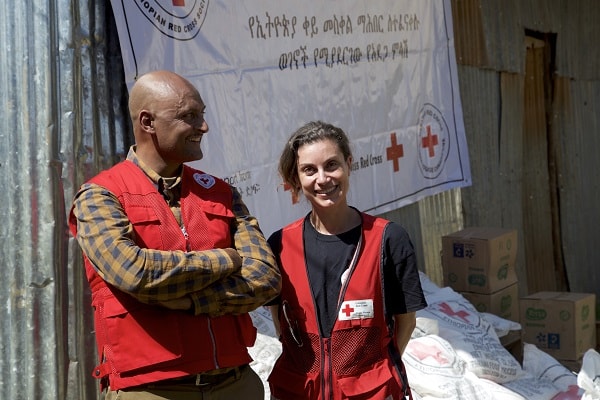An obvious sense of pride washes over Abebe Dotamo when he talks about his homeland.
He describes Ethiopia as a country with a long history of people from different ethnicities, religions and cultures living and working together in harmony.
“I love Ethiopia. I really love my country,” he says with a large smile.
That pride and passion is something that Abebe brings to his work as the local branch manager of the Kembata Zone for the Ethiopian Red Cross.
Abebe started his journey with the Red Cross later in life. He joined the organization in 2015 after working as a teacher for 17 years and then with different government offices.
However, in just four years, Abebe has faced his fair share of challenges.
Ethiopia has faced years of severe drought and flooding, causing resources like land and water to become scarce. 2018 was the tipping point, with conflicts breaking out across the country – often playing out along ethnic lines.
More than 30,000 people have fled from the violence to communities across Abebe’s homeland of Kembata since October 2018.
With the influx of people, resources like food, clean drinking water and health services are being stretched thin. While some people are fortunate to have family or friends to stay with, others are forced to stay in schools or community centres, sleeping on concrete floors with little privacy.
Abebe and his team of Red Cross volunteers are distributing supplies to displaced families. The days are long and hard, but Abebe says he wouldn’t have it any other way.
Working in partnership
In 2018 alone, roughly 2.4 million Ethiopians have been forced to flee their homes because of ongoing conflict. This makes Ethiopia the country with the most newly internally displaced people in the past year.
“The number of internally displaced people in the country is now alarmingly increasing,” says Hailu Debebe, emergency program coordinator with the Ethiopian Red Cross.
“This is a huge humanitarian catastrophe and it needs a huge response.”
Recognizing the growing need across the country, the Ethiopian Red Cross called upon support from Red Cross and Red Crescent Movement partners.

Canadian Red Cross aid worker Norine Naguib represents the consortium of the Canadian, Swiss and Danish National Societies supporting the work of the Ethiopian Red Cross to support displaced communities.
“The approach of the consortium was an idea that came through a lot of discussion with the Ethiopian Red Cross,” Norine explains. “We thought that if we pooled our resources, we could streamline the response, make the work of the Ethiopian Red Cross a little bit easier and help them get more supplies to more people, more quickly – and I think that’s what we’re seeing now.”
To date, the Red Cross has provided assistance to more than 10,000 displaced people, with a focus on mothers and young children. This much-needed assistance includes items like hygiene products, cooking materials and a highly nutritious corn-soybean mixture.
“A lot of (people) are displaced urgently in the middle of the night and they flee with nothing. Some of the women have told me that they grabbed their babies and they ran,” Norine recalls. “They really are in a critical, critical situation and that's the area that the Red Cross is focusing on.”
Through trainings and knowledge sharing between the National Societies, the consortium is helping build the capacity of local Red Cross staff and volunteers on the ground.
“They are helping us with our report writing, how to keep standards, how to see things from a different angle,” Hailu says. “We are getting very fast, timely support.”
The partnership is also helping grow support for the National Society across the country, Hailu adds.
“When people see that we are addressing the local community when they are in need, they will be encouraged to stand with the Ethiopian Red Cross Society and contribute something to another future disaster or calamity that may happen,” he explains.
And with conflicts expected to continue well into 2019, this growing support is critical.
The future for Ethiopia
“The lives of these people are forever changed,” Norine says. “They are telling us they have no plans of returning home - it's unsafe. They will have to resettle and start anew.”
Meeting the basic needs of displaced families is the first step towards building their new lives, providing them with a sense of security and dignity that encourages them to go on.
“It's my strong hope that they will lead a better life after this difficult situation,” Hailu says, “and that they will lead a peaceful and sustainable life.”
Ethiopia is full of compassionate and hardworking people and the Red Cross is built from members of communities across the country.
Abebe says he is hopeful that Ethiopia will return to what he once knew – a country where people live and work together in harmony. Until then, he says he’ll keep working tirelessly to support those in need.
“I cannot bring time back, but I am committed to work for the Red Cross for the rest of my life,” he says. “I am happy to do this.”

